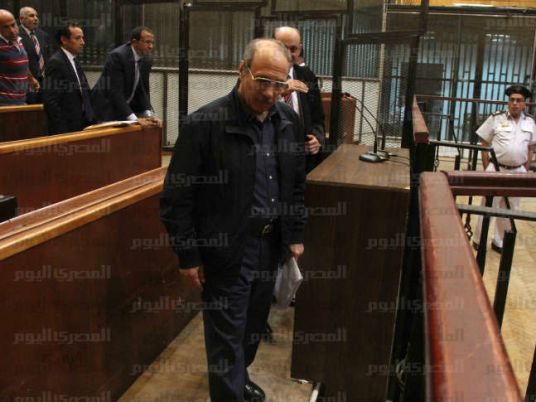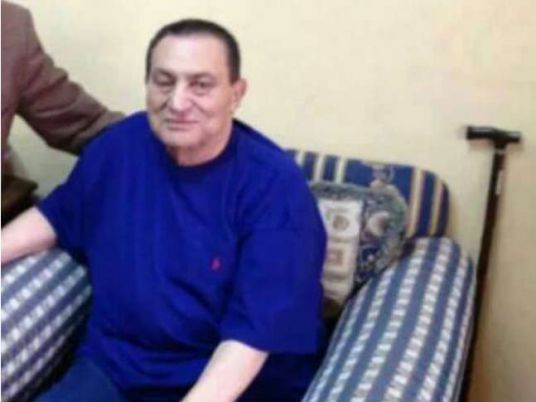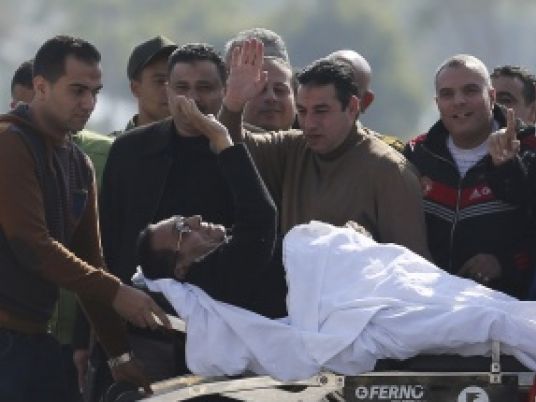In the second session of the criminal prosecution of Hosni Mubarak today, the judge, Ahmad Refaat, joined the former president’s case to that of former Interior Minister Habib al-Adly and banned live television coverage of the trial from now on.
Refaat also ordered the adjournment of Mubarak’s trial until 5 September.
“Until today, these are very normal proceedings and the judge is making what seem to be sensible decisions," said Gamal Eid, a human rights lawyer who is representing the families of those killed during the uprising that led to Mubarak’s downfall.
The 100-plus lawyers filing civil claims on behalf of the revolution’s martyrs have also faced criticism and questions about their efficacy.
Mubarak, Adly, and six senior interior ministry officials stand accused of conspiring to kill protesters during the uprising. Mubarak is also charged, along with his two sons and businessman Hussein Salem, of squandering public funds and profiteering. Mubarak’s sons stood beside their father today in the defendants’ cage, while Salem, who is in Spain, is being tried in abstentia.
Mubarak was flown to the Police Academy, where the trial is being held on the outskirts of Cairo, from the International Medical Center where he is hospitalized. He appeared in the courtroom’s cage lying on a stretcher, with an IV on his left hand side. Mubarak reportedly suffers from a variety of health problems and his doctors’ testimony has been requested for later on in the trial.
The former president appeared to be wearing a blue suit, unlike his two sons who wore the white uniform assigned to criminal suspects.
The defendants did not speak during the three-hour-long session, except at the beginning to announce that they were “present” when called by the judge.
Refaat’s decision to merge Adly's and Mubarak’s cases was in direct response to a demand from Sameh Ashour, a lawyer arguing civil claims on behalf of those killed during the uprising.
"The decision to join the two cases is correcting Abdel Salam Gomaa's mistake to separate them to begin with," said Eid, who also heads the Arab Network for Human Rights Information. Gomaa is the Criminal Court judge who previously oversaw Adly’s case before it was transferred to Refaat.
For those hoping for an efficient prosecution, this is a welcome step. "Consolidating both cases into one means that the court is acknowledging the killing of the protesters as one incident," said Ahmed Ragheb, a lawyer who is also the executive director of the Hisham Mubarak Law Center.
This also means that the incidents in question will be evaluated equally, so that Adly cannot be charged with murder while Mubarak is charged with involuntarily manslaughter in the same case.
"This also makes for a better situation for the lawyers who would be able to prepare for a consolidated case, instead of having to run between different courts trying the same incident, on behalf of the same plaintiffs [but against different defendants]," Ragheb added.
Ashour had also demanded that the conspiracy to murder charges be separated from the corruption charges to ensure a better process. Refaat did not respond to this demand.
“The court has every right to take its time in deciding if, when, and how it would heed the prosecution's request to separate the corruption charges from the protesters’ murder charges," Eid said.
In his final statements following an hour-long court recess, Refaat also announced that the upcoming hearings won’t be broadcast on television in order to “maintain public interest.”
Calls for public and transparent trials for figures of the former regime have been a main demand from protesters since Mubarak’s ouster in February.
Eid, however, said that this is not a major shift from what the plaintiff’s lawyers originally requested. “We originally wanted the judge to decide not to air the portion of the trial when the lawyers call witnesses and make their arguments," Eid said.
According to Eid, “This would have been legally important so as not to show the faces of the witnesses”, for their own protection.
Eid also assumes that one of the reasons behind the decision to take the trial off air is to decrease the number of lawyers in the courtroom.
Scores of lawyers arrived in court today ostensibly to represent the families of the martyrs. Only proof of membership in the Lawyers Syndicate was required for entry to the courtroom.
“Some may be opportunists who are looking for a spot on television. This would allow the rest of the lawyers and the judge himself to focus more on the proceedings,” Eid said.
During Adly’s hearing yesterday, Refaat reprimanded the lawyers repeatedly and called for four separate recesses to restore order to the courtroom.
“We wanted to hold the case on a daily basis but it became impossible because of lack of order. The list of lawyers demanding to speak has exceeded 100 names. We won’t continue the trial unless order and silence are restored," said Refaat during today’s hearing.
“We surmounted many obstacles in order to preserve everyone’s rights,” Refaat said. “The martyrs’ families’ lawyers have rights as well as the defendants. We don’t mind receiving all demands in writing and we need to avoid redundancy.”
While some observers are dismissive of the martyrs’ families’ lawyers’ lack of organization, others were not concerned.
“It is very difficult to gain consensus given the number of lawyers and egos involved. It has a negative effect, but will not affect the actual legal process, beyond trivial technicalities,” said Ahmed Said Halawa, an appeals court lawyer.
Halawa added that Ashour’s opening statement showed that there was some organization to lawyers representing the plaintiffs, but it would be better if they organized more effectively. Nonetheless, he said, the judge has a legal obligation to listen to all their demands, either orally or in writing.
Meanwhile, Eid added that not airing the trial on television doesn’t mean it is no longer public. “There are still lawyers, journalists and activists present to make it public,” he said.
When it was the defendants’ lawyers’ turn to speak, Fareed el-Deeb, head of Mubarak’s legal team, added new demands to what he had requested in the first hearing on 3 August.
Deeb demanded to see a report from the Administrative Monitoring Authority’s investigation into the illegal acquisition of villas by Mubarak, which is the basis of the profiteering charges.
He also demanded to see reports from the Ambulance Authority regarding all those injured or killed between 25 January and 31 January. He asked for photocopies of documents used by the prosecutor to justify the charges, as well as minutes of the trial’s hearings. He also demanded that the case be adjourned for “a long enough time for the defense team to study the requested documents.”
The call to prolong the case raised some concerns, especially as pro-revolution forces have complained that the delivery of justice for members of Mubarak’s regime has been slow.
“The defense lawyer needs to make these requests [for prolonging the case] so that at least they can make the smallest victory possible, extending the trial,” said Halawa.
When a lawyer knows that the odds are stacked against him in a case, whether from public opinion or the high probability that his client is guilty, prolonging the trial is always in the best interest of the defense, Halawa added.
During the 3 August hearing, Deeb had demanded the content of memory cards that have information about the case, missing photocopies of the interrogation files of the former president’s younger son Gamal, testimonies of all 1761 witnesses in the case, as well as those of the head of the Supreme Council of the Armed Forces Field Marshal Hussein Tantawi, Mubarak’s German physician, seven former governors of South Sinai, and its former secretary.




